Options in Civil Procedure
VerifiedAdded on 2023/03/31
|9
|1992
|305
AI Summary
This article discusses the options available to each party in civil procedure cases, with reference to relevant cases and legislation. It explores the legal relationship between the parties, the existence of a claim, possible remedies, and more. Read more on Desklib.
Contribute Materials
Your contribution can guide someone’s learning journey. Share your
documents today.
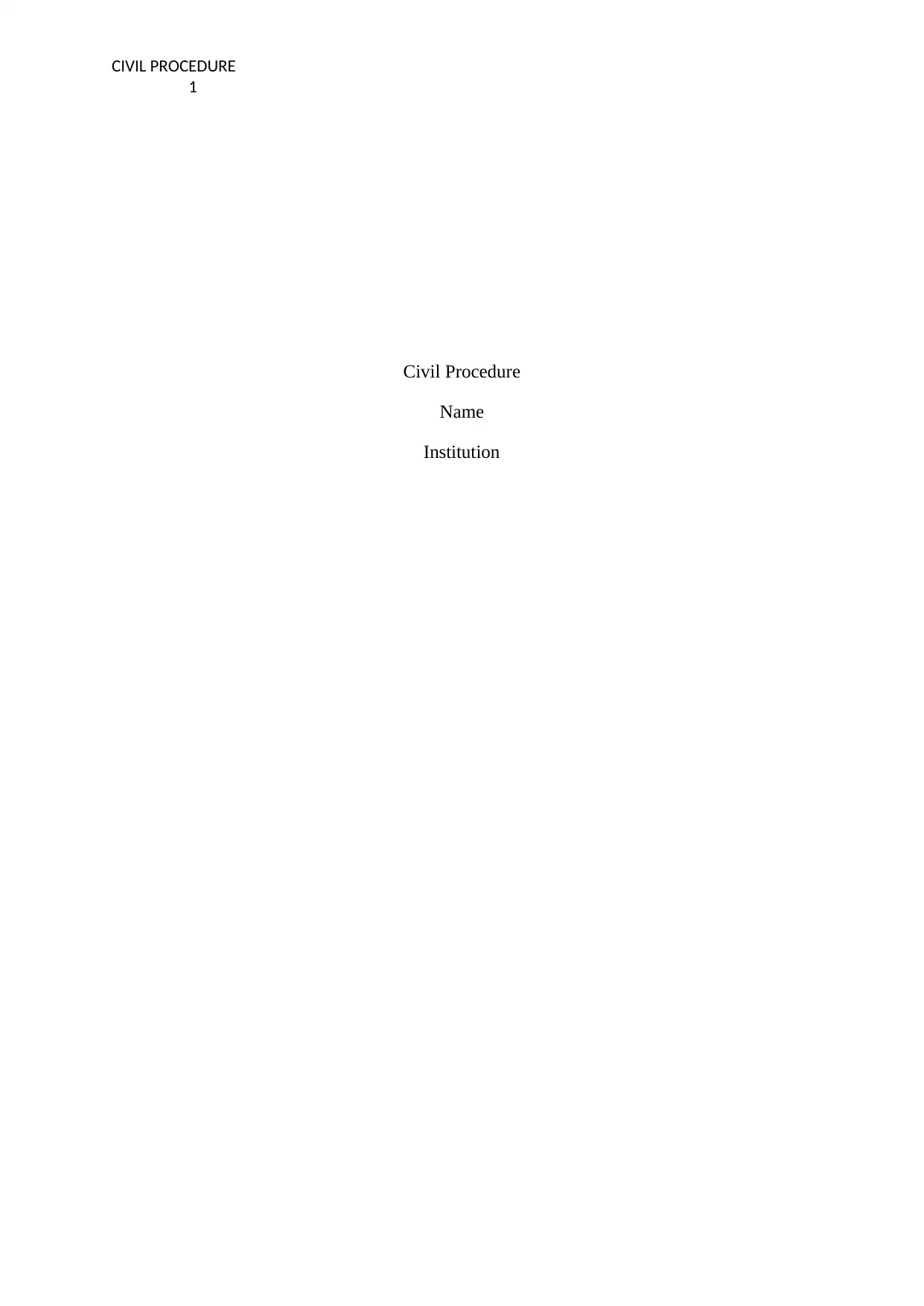
CIVIL PROCEDURE
1
Civil Procedure
Name
Institution
1
Civil Procedure
Name
Institution
Secure Best Marks with AI Grader
Need help grading? Try our AI Grader for instant feedback on your assignments.
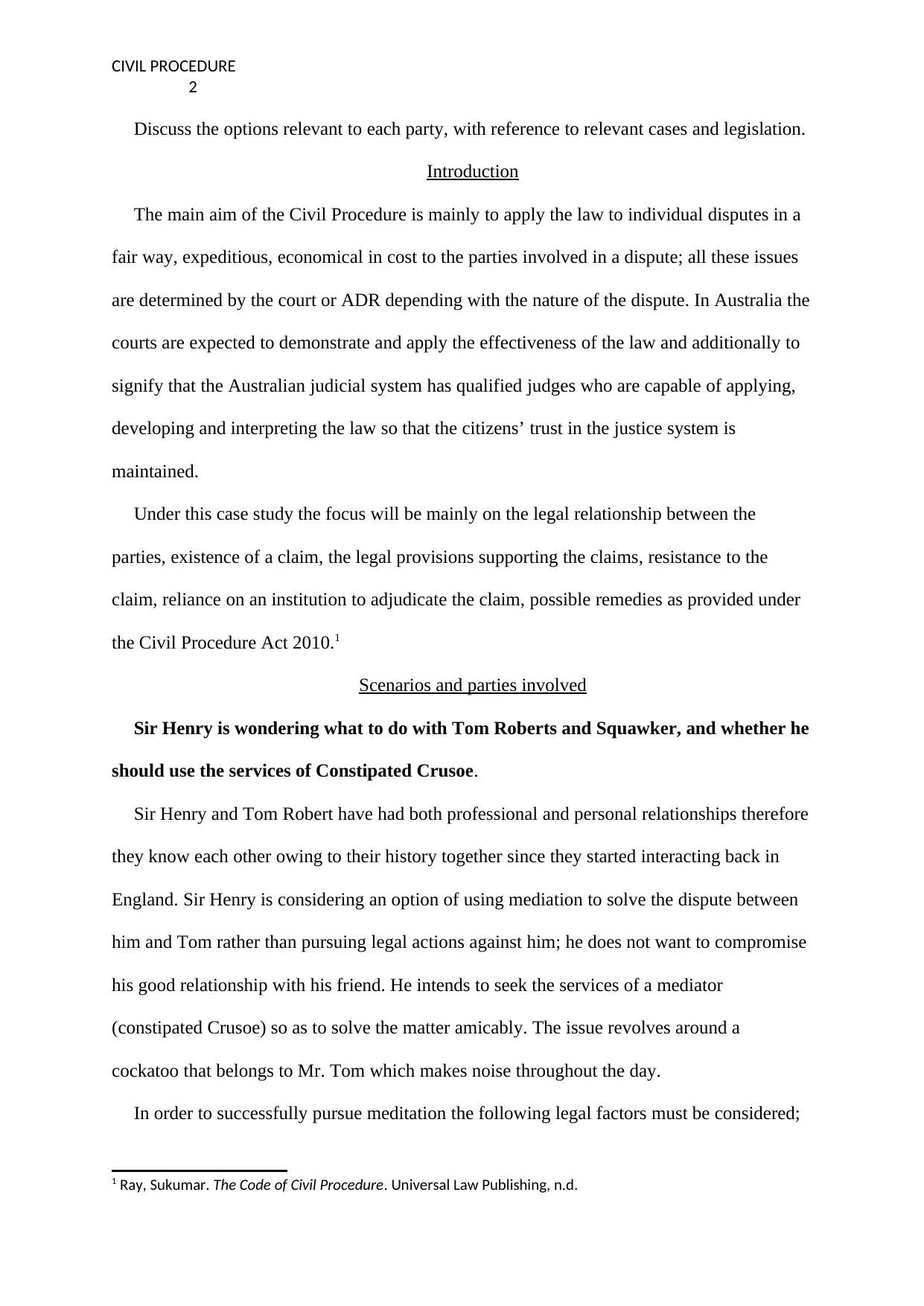
CIVIL PROCEDURE
2
Discuss the options relevant to each party, with reference to relevant cases and legislation.
Introduction
The main aim of the Civil Procedure is mainly to apply the law to individual disputes in a
fair way, expeditious, economical in cost to the parties involved in a dispute; all these issues
are determined by the court or ADR depending with the nature of the dispute. In Australia the
courts are expected to demonstrate and apply the effectiveness of the law and additionally to
signify that the Australian judicial system has qualified judges who are capable of applying,
developing and interpreting the law so that the citizens’ trust in the justice system is
maintained.
Under this case study the focus will be mainly on the legal relationship between the
parties, existence of a claim, the legal provisions supporting the claims, resistance to the
claim, reliance on an institution to adjudicate the claim, possible remedies as provided under
the Civil Procedure Act 2010.1
Scenarios and parties involved
Sir Henry is wondering what to do with Tom Roberts and Squawker, and whether he
should use the services of Constipated Crusoe.
Sir Henry and Tom Robert have had both professional and personal relationships therefore
they know each other owing to their history together since they started interacting back in
England. Sir Henry is considering an option of using mediation to solve the dispute between
him and Tom rather than pursuing legal actions against him; he does not want to compromise
his good relationship with his friend. He intends to seek the services of a mediator
(constipated Crusoe) so as to solve the matter amicably. The issue revolves around a
cockatoo that belongs to Mr. Tom which makes noise throughout the day.
In order to successfully pursue meditation the following legal factors must be considered;
1 Ray, Sukumar. The Code of Civil Procedure. Universal Law Publishing, n.d.
2
Discuss the options relevant to each party, with reference to relevant cases and legislation.
Introduction
The main aim of the Civil Procedure is mainly to apply the law to individual disputes in a
fair way, expeditious, economical in cost to the parties involved in a dispute; all these issues
are determined by the court or ADR depending with the nature of the dispute. In Australia the
courts are expected to demonstrate and apply the effectiveness of the law and additionally to
signify that the Australian judicial system has qualified judges who are capable of applying,
developing and interpreting the law so that the citizens’ trust in the justice system is
maintained.
Under this case study the focus will be mainly on the legal relationship between the
parties, existence of a claim, the legal provisions supporting the claims, resistance to the
claim, reliance on an institution to adjudicate the claim, possible remedies as provided under
the Civil Procedure Act 2010.1
Scenarios and parties involved
Sir Henry is wondering what to do with Tom Roberts and Squawker, and whether he
should use the services of Constipated Crusoe.
Sir Henry and Tom Robert have had both professional and personal relationships therefore
they know each other owing to their history together since they started interacting back in
England. Sir Henry is considering an option of using mediation to solve the dispute between
him and Tom rather than pursuing legal actions against him; he does not want to compromise
his good relationship with his friend. He intends to seek the services of a mediator
(constipated Crusoe) so as to solve the matter amicably. The issue revolves around a
cockatoo that belongs to Mr. Tom which makes noise throughout the day.
In order to successfully pursue meditation the following legal factors must be considered;
1 Ray, Sukumar. The Code of Civil Procedure. Universal Law Publishing, n.d.
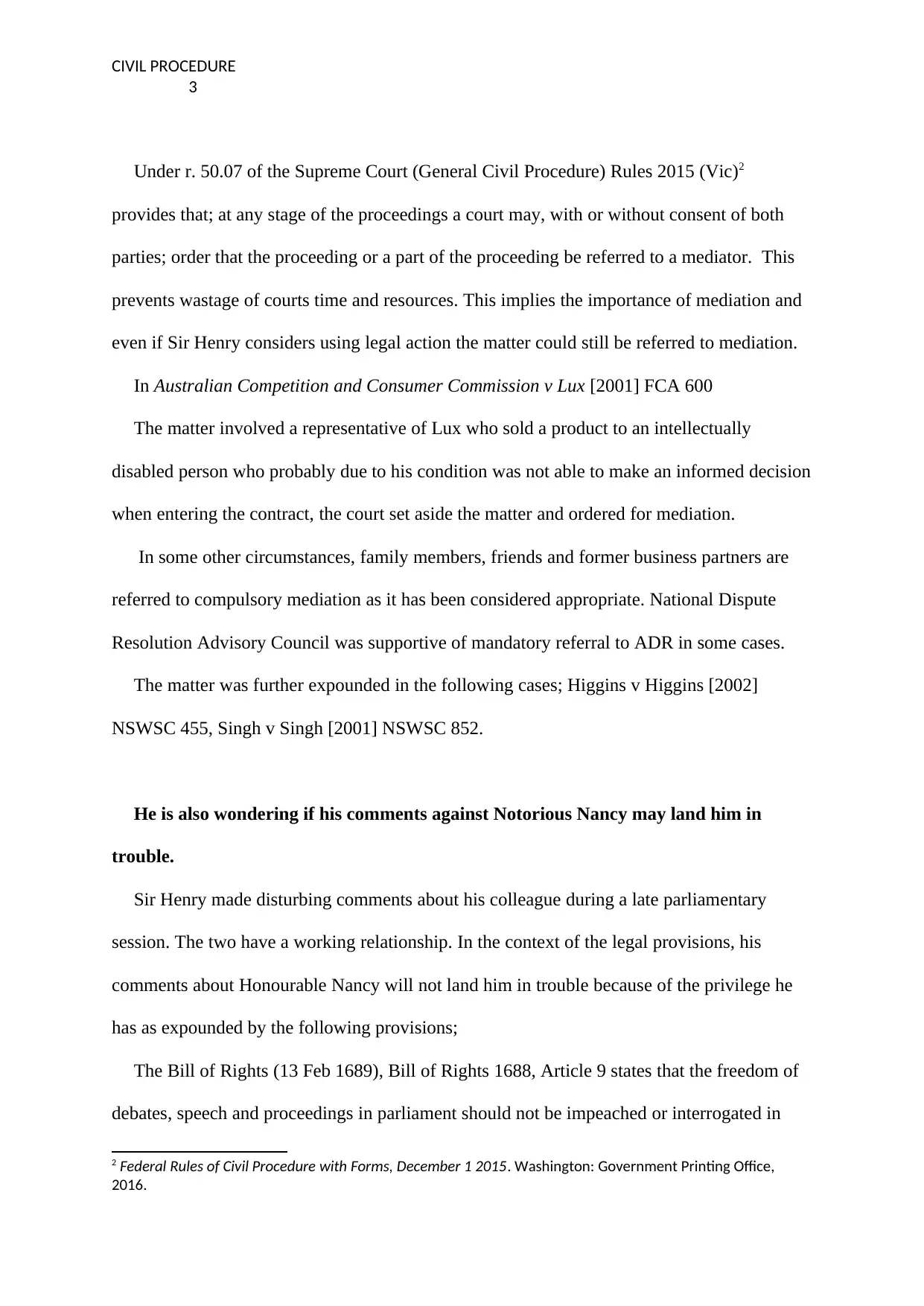
CIVIL PROCEDURE
3
Under r. 50.07 of the Supreme Court (General Civil Procedure) Rules 2015 (Vic)2
provides that; at any stage of the proceedings a court may, with or without consent of both
parties; order that the proceeding or a part of the proceeding be referred to a mediator. This
prevents wastage of courts time and resources. This implies the importance of mediation and
even if Sir Henry considers using legal action the matter could still be referred to mediation.
In Australian Competition and Consumer Commission v Lux [2001] FCA 600
The matter involved a representative of Lux who sold a product to an intellectually
disabled person who probably due to his condition was not able to make an informed decision
when entering the contract, the court set aside the matter and ordered for mediation.
In some other circumstances, family members, friends and former business partners are
referred to compulsory mediation as it has been considered appropriate. National Dispute
Resolution Advisory Council was supportive of mandatory referral to ADR in some cases.
The matter was further expounded in the following cases; Higgins v Higgins [2002]
NSWSC 455, Singh v Singh [2001] NSWSC 852.
He is also wondering if his comments against Notorious Nancy may land him in
trouble.
Sir Henry made disturbing comments about his colleague during a late parliamentary
session. The two have a working relationship. In the context of the legal provisions, his
comments about Honourable Nancy will not land him in trouble because of the privilege he
has as expounded by the following provisions;
The Bill of Rights (13 Feb 1689), Bill of Rights 1688, Article 9 states that the freedom of
debates, speech and proceedings in parliament should not be impeached or interrogated in
2 Federal Rules of Civil Procedure with Forms, December 1 2015. Washington: Government Printing Office,
2016.
3
Under r. 50.07 of the Supreme Court (General Civil Procedure) Rules 2015 (Vic)2
provides that; at any stage of the proceedings a court may, with or without consent of both
parties; order that the proceeding or a part of the proceeding be referred to a mediator. This
prevents wastage of courts time and resources. This implies the importance of mediation and
even if Sir Henry considers using legal action the matter could still be referred to mediation.
In Australian Competition and Consumer Commission v Lux [2001] FCA 600
The matter involved a representative of Lux who sold a product to an intellectually
disabled person who probably due to his condition was not able to make an informed decision
when entering the contract, the court set aside the matter and ordered for mediation.
In some other circumstances, family members, friends and former business partners are
referred to compulsory mediation as it has been considered appropriate. National Dispute
Resolution Advisory Council was supportive of mandatory referral to ADR in some cases.
The matter was further expounded in the following cases; Higgins v Higgins [2002]
NSWSC 455, Singh v Singh [2001] NSWSC 852.
He is also wondering if his comments against Notorious Nancy may land him in
trouble.
Sir Henry made disturbing comments about his colleague during a late parliamentary
session. The two have a working relationship. In the context of the legal provisions, his
comments about Honourable Nancy will not land him in trouble because of the privilege he
has as expounded by the following provisions;
The Bill of Rights (13 Feb 1689), Bill of Rights 1688, Article 9 states that the freedom of
debates, speech and proceedings in parliament should not be impeached or interrogated in
2 Federal Rules of Civil Procedure with Forms, December 1 2015. Washington: Government Printing Office,
2016.
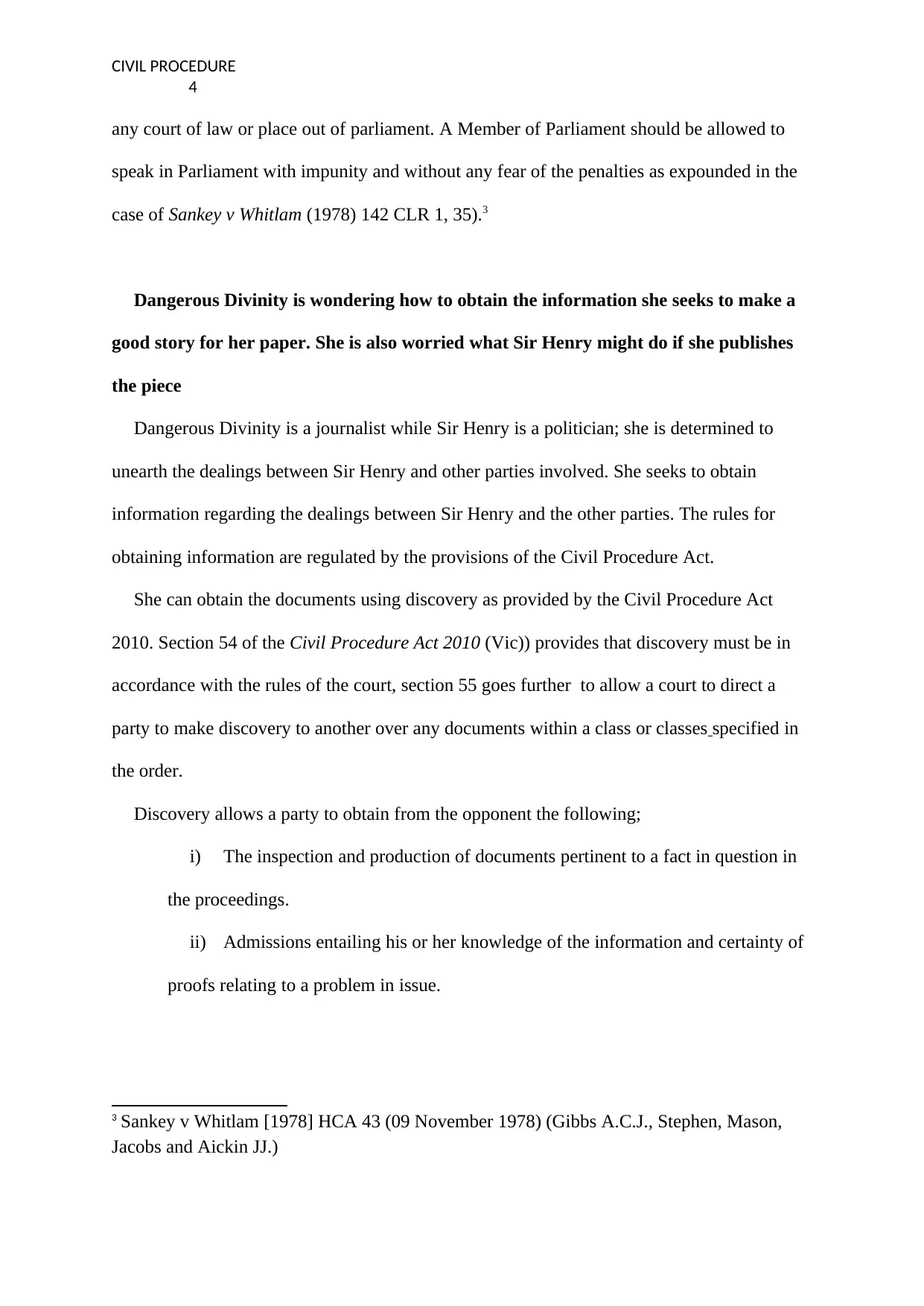
CIVIL PROCEDURE
4
any court of law or place out of parliament. A Member of Parliament should be allowed to
speak in Parliament with impunity and without any fear of the penalties as expounded in the
case of Sankey v Whitlam (1978) 142 CLR 1, 35).3
Dangerous Divinity is wondering how to obtain the information she seeks to make a
good story for her paper. She is also worried what Sir Henry might do if she publishes
the piece
Dangerous Divinity is a journalist while Sir Henry is a politician; she is determined to
unearth the dealings between Sir Henry and other parties involved. She seeks to obtain
information regarding the dealings between Sir Henry and the other parties. The rules for
obtaining information are regulated by the provisions of the Civil Procedure Act.
She can obtain the documents using discovery as provided by the Civil Procedure Act
2010. Section 54 of the Civil Procedure Act 2010 (Vic)) provides that discovery must be in
accordance with the rules of the court, section 55 goes further to allow a court to direct a
party to make discovery to another over any documents within a class or classes specified in
the order.
Discovery allows a party to obtain from the opponent the following;
i) The inspection and production of documents pertinent to a fact in question in
the proceedings.
ii) Admissions entailing his or her knowledge of the information and certainty of
proofs relating to a problem in issue.
3 Sankey v Whitlam [1978] HCA 43 (09 November 1978) (Gibbs A.C.J., Stephen, Mason,
Jacobs and Aickin JJ.)
4
any court of law or place out of parliament. A Member of Parliament should be allowed to
speak in Parliament with impunity and without any fear of the penalties as expounded in the
case of Sankey v Whitlam (1978) 142 CLR 1, 35).3
Dangerous Divinity is wondering how to obtain the information she seeks to make a
good story for her paper. She is also worried what Sir Henry might do if she publishes
the piece
Dangerous Divinity is a journalist while Sir Henry is a politician; she is determined to
unearth the dealings between Sir Henry and other parties involved. She seeks to obtain
information regarding the dealings between Sir Henry and the other parties. The rules for
obtaining information are regulated by the provisions of the Civil Procedure Act.
She can obtain the documents using discovery as provided by the Civil Procedure Act
2010. Section 54 of the Civil Procedure Act 2010 (Vic)) provides that discovery must be in
accordance with the rules of the court, section 55 goes further to allow a court to direct a
party to make discovery to another over any documents within a class or classes specified in
the order.
Discovery allows a party to obtain from the opponent the following;
i) The inspection and production of documents pertinent to a fact in question in
the proceedings.
ii) Admissions entailing his or her knowledge of the information and certainty of
proofs relating to a problem in issue.
3 Sankey v Whitlam [1978] HCA 43 (09 November 1978) (Gibbs A.C.J., Stephen, Mason,
Jacobs and Aickin JJ.)
Secure Best Marks with AI Grader
Need help grading? Try our AI Grader for instant feedback on your assignments.
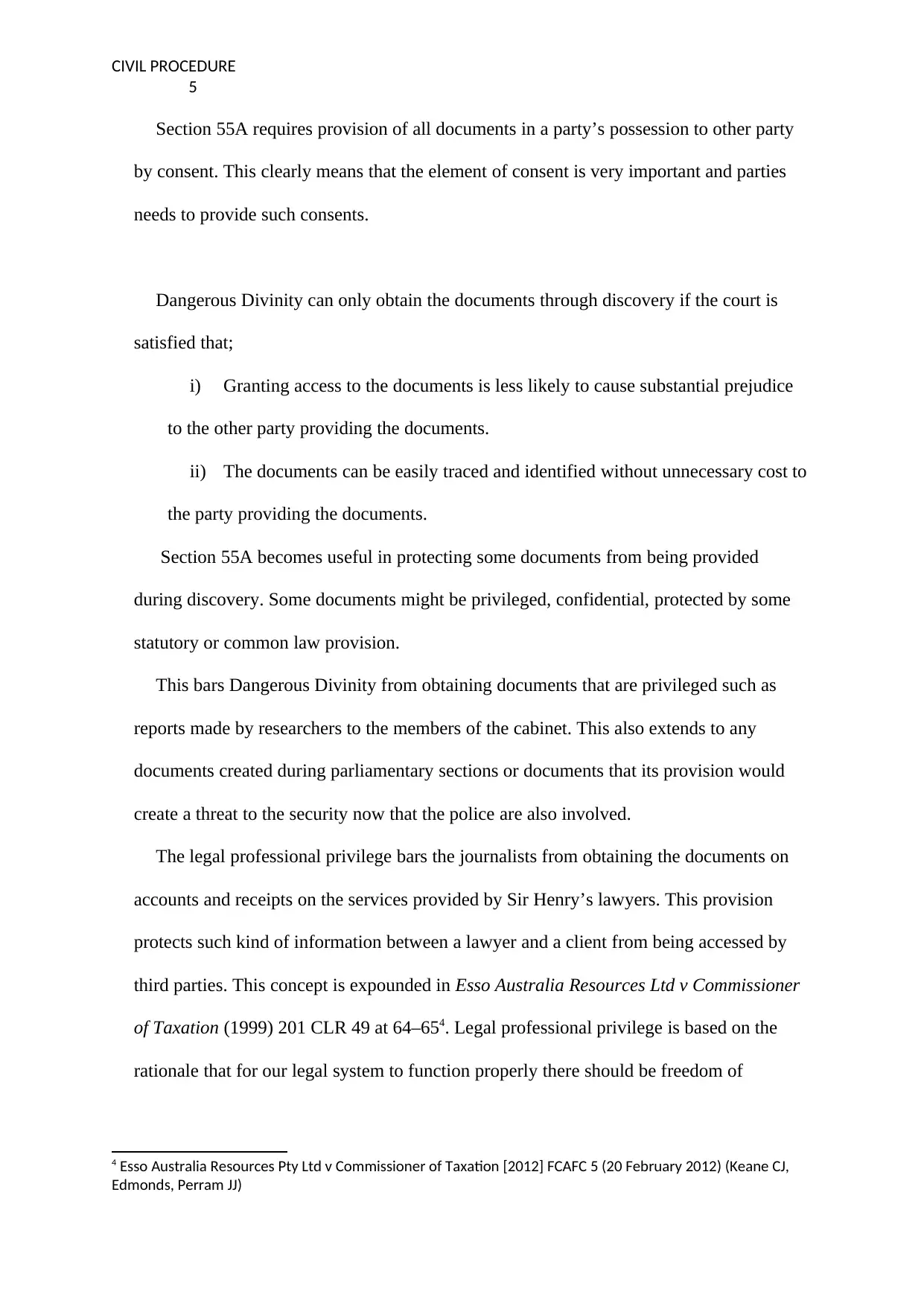
CIVIL PROCEDURE
5
Section 55A requires provision of all documents in a party’s possession to other party
by consent. This clearly means that the element of consent is very important and parties
needs to provide such consents.
Dangerous Divinity can only obtain the documents through discovery if the court is
satisfied that;
i) Granting access to the documents is less likely to cause substantial prejudice
to the other party providing the documents.
ii) The documents can be easily traced and identified without unnecessary cost to
the party providing the documents.
Section 55A becomes useful in protecting some documents from being provided
during discovery. Some documents might be privileged, confidential, protected by some
statutory or common law provision.
This bars Dangerous Divinity from obtaining documents that are privileged such as
reports made by researchers to the members of the cabinet. This also extends to any
documents created during parliamentary sections or documents that its provision would
create a threat to the security now that the police are also involved.
The legal professional privilege bars the journalists from obtaining the documents on
accounts and receipts on the services provided by Sir Henry’s lawyers. This provision
protects such kind of information between a lawyer and a client from being accessed by
third parties. This concept is expounded in Esso Australia Resources Ltd v Commissioner
of Taxation (1999) 201 CLR 49 at 64–654. Legal professional privilege is based on the
rationale that for our legal system to function properly there should be freedom of
4 Esso Australia Resources Pty Ltd v Commissioner of Taxation [2012] FCAFC 5 (20 February 2012) (Keane CJ,
Edmonds, Perram JJ)
5
Section 55A requires provision of all documents in a party’s possession to other party
by consent. This clearly means that the element of consent is very important and parties
needs to provide such consents.
Dangerous Divinity can only obtain the documents through discovery if the court is
satisfied that;
i) Granting access to the documents is less likely to cause substantial prejudice
to the other party providing the documents.
ii) The documents can be easily traced and identified without unnecessary cost to
the party providing the documents.
Section 55A becomes useful in protecting some documents from being provided
during discovery. Some documents might be privileged, confidential, protected by some
statutory or common law provision.
This bars Dangerous Divinity from obtaining documents that are privileged such as
reports made by researchers to the members of the cabinet. This also extends to any
documents created during parliamentary sections or documents that its provision would
create a threat to the security now that the police are also involved.
The legal professional privilege bars the journalists from obtaining the documents on
accounts and receipts on the services provided by Sir Henry’s lawyers. This provision
protects such kind of information between a lawyer and a client from being accessed by
third parties. This concept is expounded in Esso Australia Resources Ltd v Commissioner
of Taxation (1999) 201 CLR 49 at 64–654. Legal professional privilege is based on the
rationale that for our legal system to function properly there should be freedom of
4 Esso Australia Resources Pty Ltd v Commissioner of Taxation [2012] FCAFC 5 (20 February 2012) (Keane CJ,
Edmonds, Perram JJ)
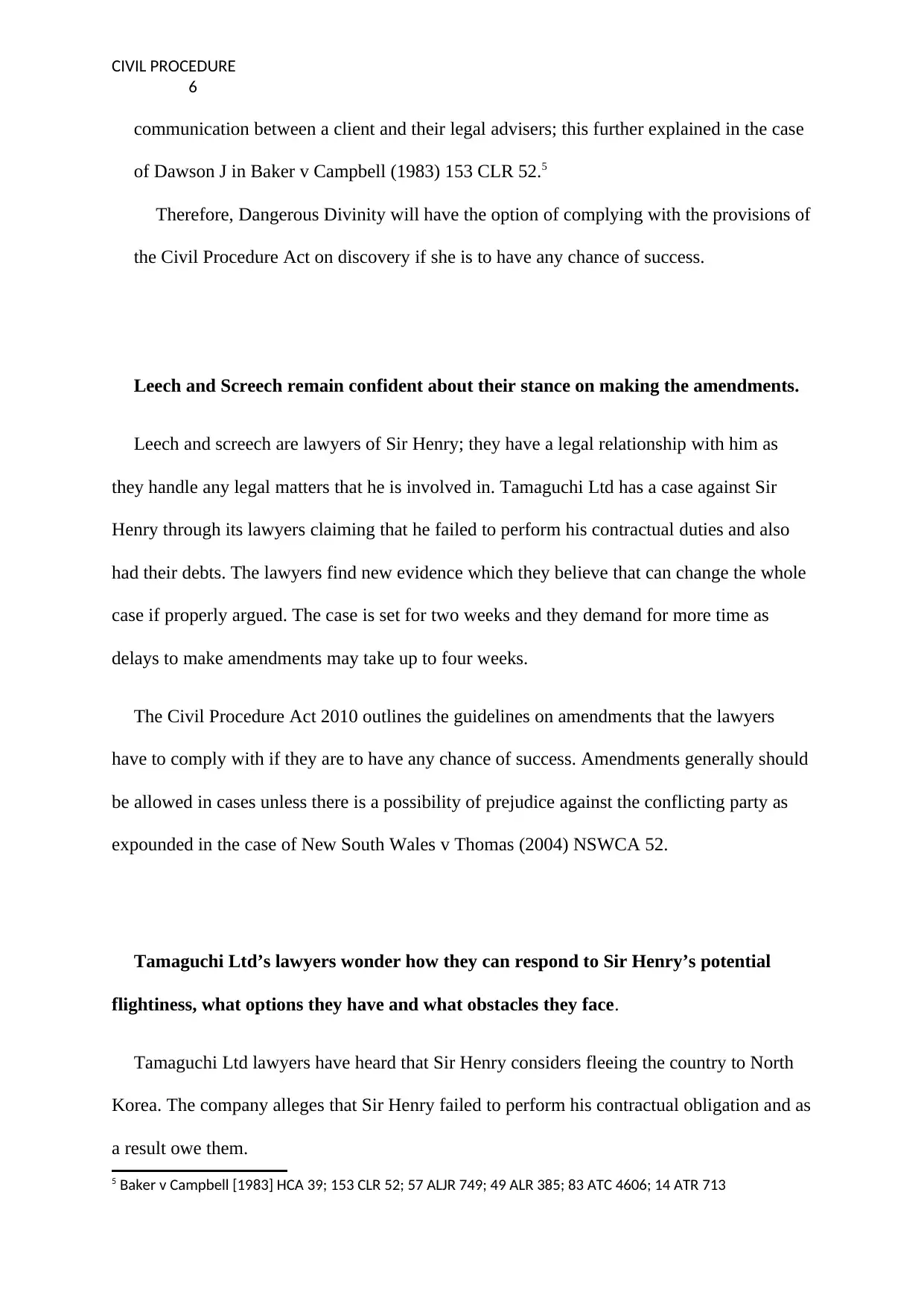
CIVIL PROCEDURE
6
communication between a client and their legal advisers; this further explained in the case
of Dawson J in Baker v Campbell (1983) 153 CLR 52.5
Therefore, Dangerous Divinity will have the option of complying with the provisions of
the Civil Procedure Act on discovery if she is to have any chance of success.
Leech and Screech remain confident about their stance on making the amendments.
Leech and screech are lawyers of Sir Henry; they have a legal relationship with him as
they handle any legal matters that he is involved in. Tamaguchi Ltd has a case against Sir
Henry through its lawyers claiming that he failed to perform his contractual duties and also
had their debts. The lawyers find new evidence which they believe that can change the whole
case if properly argued. The case is set for two weeks and they demand for more time as
delays to make amendments may take up to four weeks.
The Civil Procedure Act 2010 outlines the guidelines on amendments that the lawyers
have to comply with if they are to have any chance of success. Amendments generally should
be allowed in cases unless there is a possibility of prejudice against the conflicting party as
expounded in the case of New South Wales v Thomas (2004) NSWCA 52.
Tamaguchi Ltd’s lawyers wonder how they can respond to Sir Henry’s potential
flightiness, what options they have and what obstacles they face.
Tamaguchi Ltd lawyers have heard that Sir Henry considers fleeing the country to North
Korea. The company alleges that Sir Henry failed to perform his contractual obligation and as
a result owe them.
5 Baker v Campbell [1983] HCA 39; 153 CLR 52; 57 ALJR 749; 49 ALR 385; 83 ATC 4606; 14 ATR 713
6
communication between a client and their legal advisers; this further explained in the case
of Dawson J in Baker v Campbell (1983) 153 CLR 52.5
Therefore, Dangerous Divinity will have the option of complying with the provisions of
the Civil Procedure Act on discovery if she is to have any chance of success.
Leech and Screech remain confident about their stance on making the amendments.
Leech and screech are lawyers of Sir Henry; they have a legal relationship with him as
they handle any legal matters that he is involved in. Tamaguchi Ltd has a case against Sir
Henry through its lawyers claiming that he failed to perform his contractual duties and also
had their debts. The lawyers find new evidence which they believe that can change the whole
case if properly argued. The case is set for two weeks and they demand for more time as
delays to make amendments may take up to four weeks.
The Civil Procedure Act 2010 outlines the guidelines on amendments that the lawyers
have to comply with if they are to have any chance of success. Amendments generally should
be allowed in cases unless there is a possibility of prejudice against the conflicting party as
expounded in the case of New South Wales v Thomas (2004) NSWCA 52.
Tamaguchi Ltd’s lawyers wonder how they can respond to Sir Henry’s potential
flightiness, what options they have and what obstacles they face.
Tamaguchi Ltd lawyers have heard that Sir Henry considers fleeing the country to North
Korea. The company alleges that Sir Henry failed to perform his contractual obligation and as
a result owe them.
5 Baker v Campbell [1983] HCA 39; 153 CLR 52; 57 ALJR 749; 49 ALR 385; 83 ATC 4606; 14 ATR 713
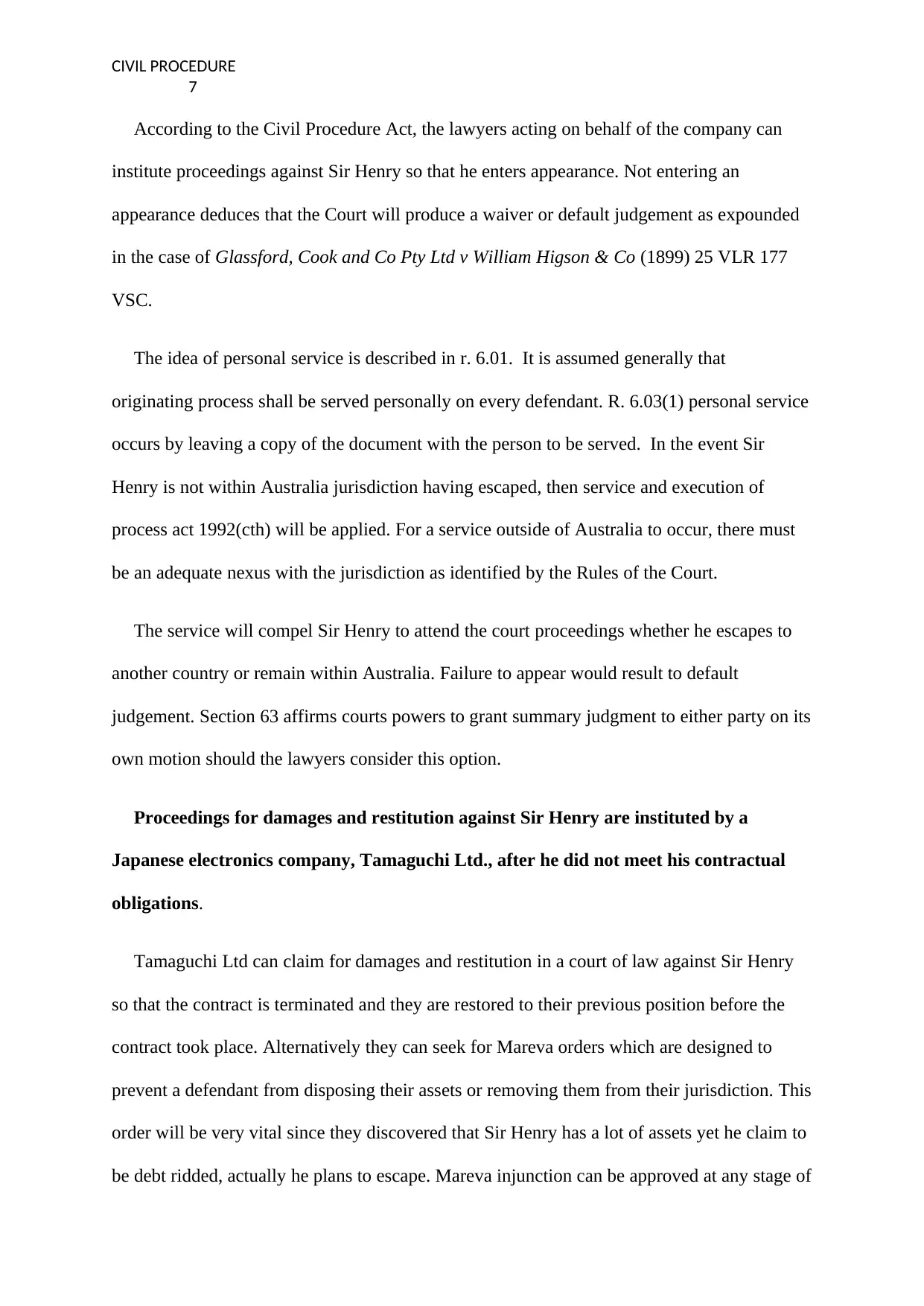
CIVIL PROCEDURE
7
According to the Civil Procedure Act, the lawyers acting on behalf of the company can
institute proceedings against Sir Henry so that he enters appearance. Not entering an
appearance deduces that the Court will produce a waiver or default judgement as expounded
in the case of Glassford, Cook and Co Pty Ltd v William Higson & Co (1899) 25 VLR 177
VSC.
The idea of personal service is described in r. 6.01. It is assumed generally that
originating process shall be served personally on every defendant. R. 6.03(1) personal service
occurs by leaving a copy of the document with the person to be served. In the event Sir
Henry is not within Australia jurisdiction having escaped, then service and execution of
process act 1992(cth) will be applied. For a service outside of Australia to occur, there must
be an adequate nexus with the jurisdiction as identified by the Rules of the Court.
The service will compel Sir Henry to attend the court proceedings whether he escapes to
another country or remain within Australia. Failure to appear would result to default
judgement. Section 63 affirms courts powers to grant summary judgment to either party on its
own motion should the lawyers consider this option.
Proceedings for damages and restitution against Sir Henry are instituted by a
Japanese electronics company, Tamaguchi Ltd., after he did not meet his contractual
obligations.
Tamaguchi Ltd can claim for damages and restitution in a court of law against Sir Henry
so that the contract is terminated and they are restored to their previous position before the
contract took place. Alternatively they can seek for Mareva orders which are designed to
prevent a defendant from disposing their assets or removing them from their jurisdiction. This
order will be very vital since they discovered that Sir Henry has a lot of assets yet he claim to
be debt ridded, actually he plans to escape. Mareva injunction can be approved at any stage of
7
According to the Civil Procedure Act, the lawyers acting on behalf of the company can
institute proceedings against Sir Henry so that he enters appearance. Not entering an
appearance deduces that the Court will produce a waiver or default judgement as expounded
in the case of Glassford, Cook and Co Pty Ltd v William Higson & Co (1899) 25 VLR 177
VSC.
The idea of personal service is described in r. 6.01. It is assumed generally that
originating process shall be served personally on every defendant. R. 6.03(1) personal service
occurs by leaving a copy of the document with the person to be served. In the event Sir
Henry is not within Australia jurisdiction having escaped, then service and execution of
process act 1992(cth) will be applied. For a service outside of Australia to occur, there must
be an adequate nexus with the jurisdiction as identified by the Rules of the Court.
The service will compel Sir Henry to attend the court proceedings whether he escapes to
another country or remain within Australia. Failure to appear would result to default
judgement. Section 63 affirms courts powers to grant summary judgment to either party on its
own motion should the lawyers consider this option.
Proceedings for damages and restitution against Sir Henry are instituted by a
Japanese electronics company, Tamaguchi Ltd., after he did not meet his contractual
obligations.
Tamaguchi Ltd can claim for damages and restitution in a court of law against Sir Henry
so that the contract is terminated and they are restored to their previous position before the
contract took place. Alternatively they can seek for Mareva orders which are designed to
prevent a defendant from disposing their assets or removing them from their jurisdiction. This
order will be very vital since they discovered that Sir Henry has a lot of assets yet he claim to
be debt ridded, actually he plans to escape. Mareva injunction can be approved at any stage of
Paraphrase This Document
Need a fresh take? Get an instant paraphrase of this document with our AI Paraphraser
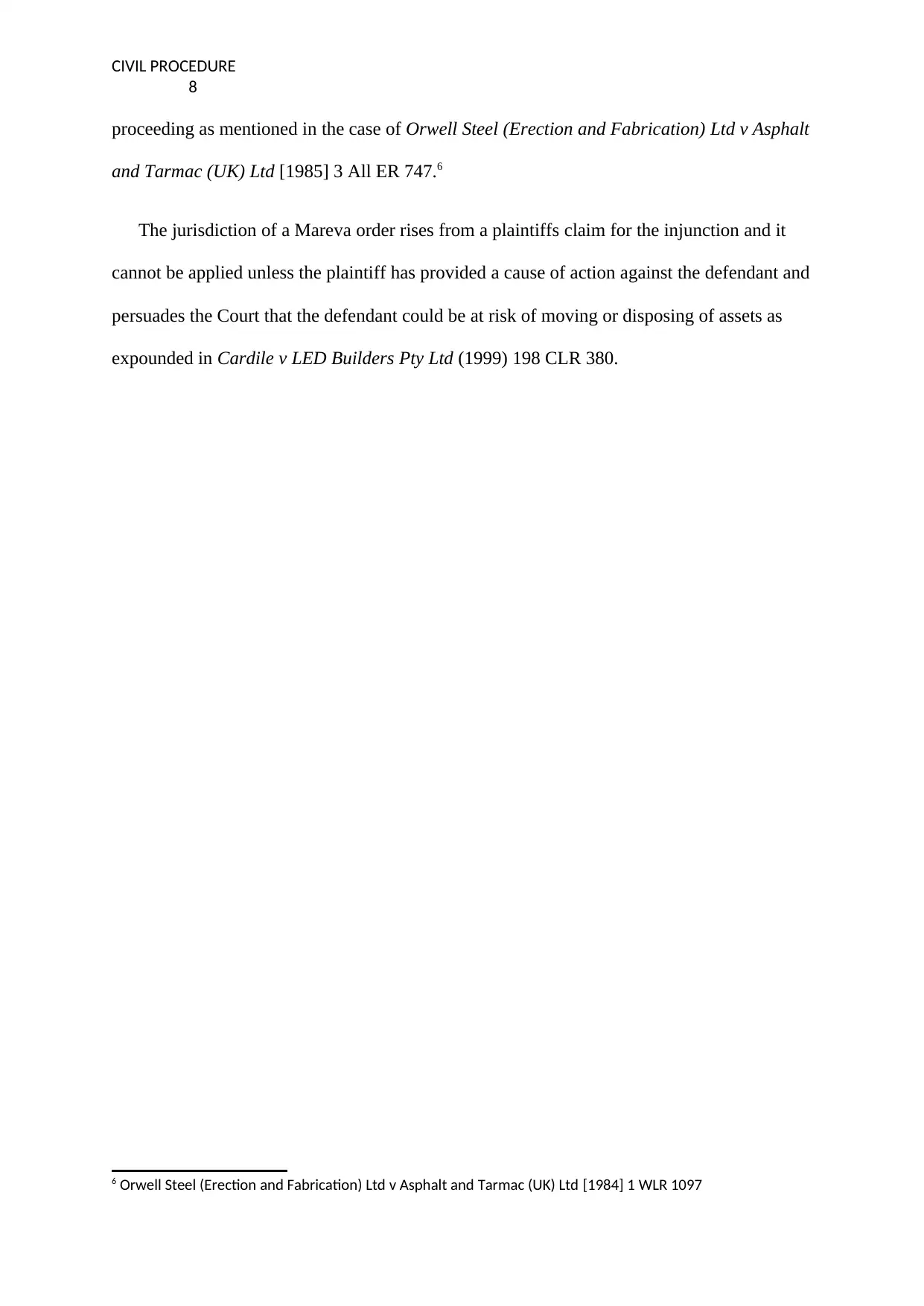
CIVIL PROCEDURE
8
proceeding as mentioned in the case of Orwell Steel (Erection and Fabrication) Ltd v Asphalt
and Tarmac (UK) Ltd [1985] 3 All ER 747.6
The jurisdiction of a Mareva order rises from a plaintiffs claim for the injunction and it
cannot be applied unless the plaintiff has provided a cause of action against the defendant and
persuades the Court that the defendant could be at risk of moving or disposing of assets as
expounded in Cardile v LED Builders Pty Ltd (1999) 198 CLR 380.
6 Orwell Steel (Erection and Fabrication) Ltd v Asphalt and Tarmac (UK) Ltd [1984] 1 WLR 1097
8
proceeding as mentioned in the case of Orwell Steel (Erection and Fabrication) Ltd v Asphalt
and Tarmac (UK) Ltd [1985] 3 All ER 747.6
The jurisdiction of a Mareva order rises from a plaintiffs claim for the injunction and it
cannot be applied unless the plaintiff has provided a cause of action against the defendant and
persuades the Court that the defendant could be at risk of moving or disposing of assets as
expounded in Cardile v LED Builders Pty Ltd (1999) 198 CLR 380.
6 Orwell Steel (Erection and Fabrication) Ltd v Asphalt and Tarmac (UK) Ltd [1984] 1 WLR 1097
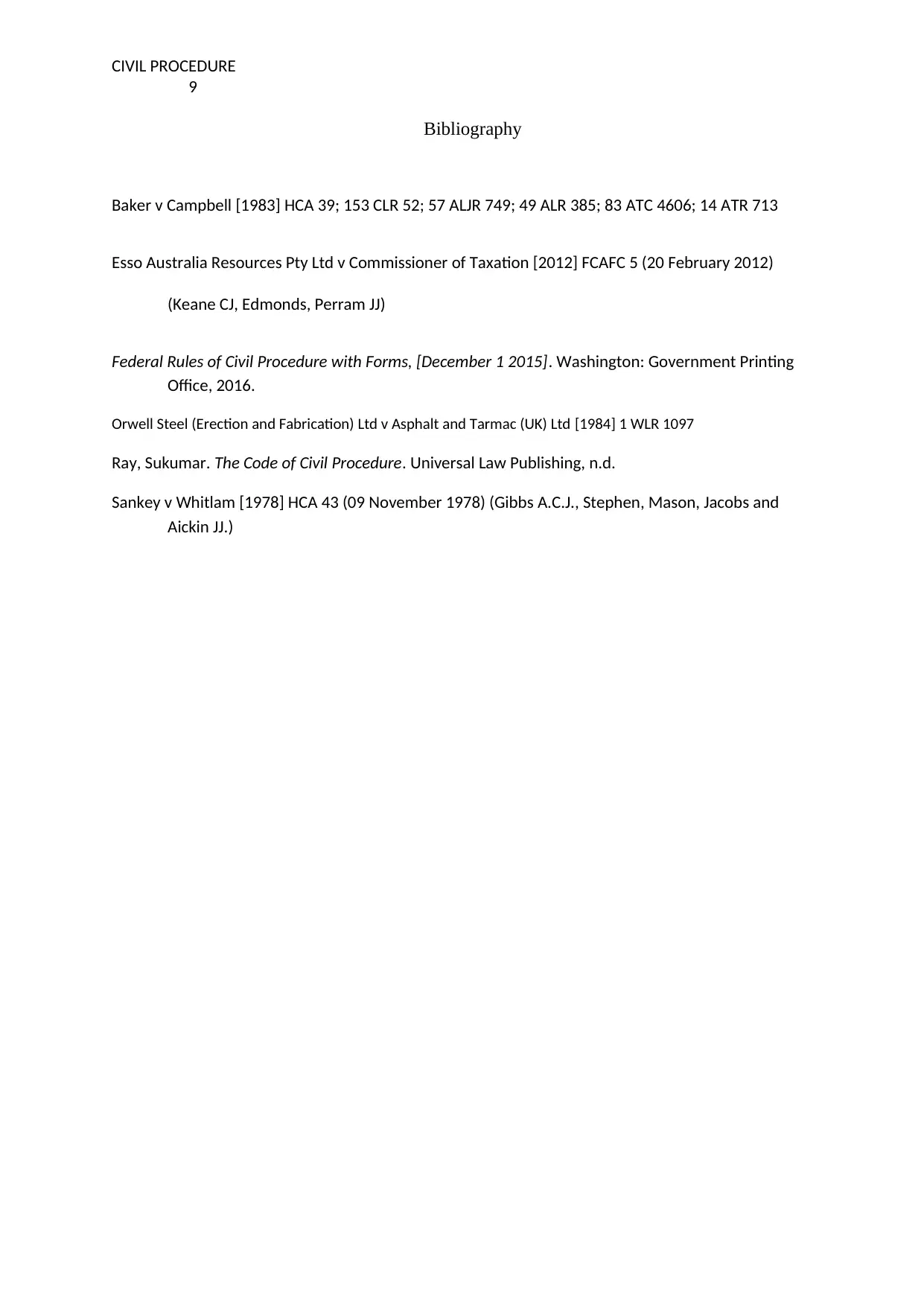
CIVIL PROCEDURE
9
Bibliography
Baker v Campbell [1983] HCA 39; 153 CLR 52; 57 ALJR 749; 49 ALR 385; 83 ATC 4606; 14 ATR 713
Esso Australia Resources Pty Ltd v Commissioner of Taxation [2012] FCAFC 5 (20 February 2012)
(Keane CJ, Edmonds, Perram JJ)
Federal Rules of Civil Procedure with Forms, [December 1 2015]. Washington: Government Printing
Office, 2016.
Orwell Steel (Erection and Fabrication) Ltd v Asphalt and Tarmac (UK) Ltd [1984] 1 WLR 1097
Ray, Sukumar. The Code of Civil Procedure. Universal Law Publishing, n.d.
Sankey v Whitlam [1978] HCA 43 (09 November 1978) (Gibbs A.C.J., Stephen, Mason, Jacobs and
Aickin JJ.)
9
Bibliography
Baker v Campbell [1983] HCA 39; 153 CLR 52; 57 ALJR 749; 49 ALR 385; 83 ATC 4606; 14 ATR 713
Esso Australia Resources Pty Ltd v Commissioner of Taxation [2012] FCAFC 5 (20 February 2012)
(Keane CJ, Edmonds, Perram JJ)
Federal Rules of Civil Procedure with Forms, [December 1 2015]. Washington: Government Printing
Office, 2016.
Orwell Steel (Erection and Fabrication) Ltd v Asphalt and Tarmac (UK) Ltd [1984] 1 WLR 1097
Ray, Sukumar. The Code of Civil Procedure. Universal Law Publishing, n.d.
Sankey v Whitlam [1978] HCA 43 (09 November 1978) (Gibbs A.C.J., Stephen, Mason, Jacobs and
Aickin JJ.)
1 out of 9
Related Documents
Your All-in-One AI-Powered Toolkit for Academic Success.
+13062052269
info@desklib.com
Available 24*7 on WhatsApp / Email
![[object Object]](/_next/static/media/star-bottom.7253800d.svg)
Unlock your academic potential
© 2024 | Zucol Services PVT LTD | All rights reserved.





